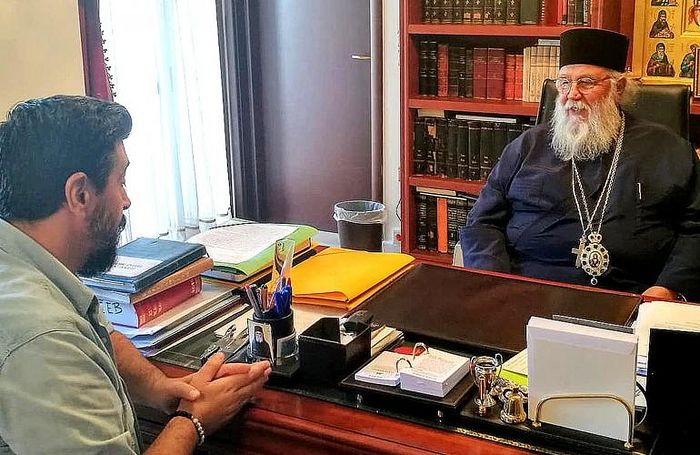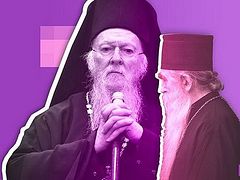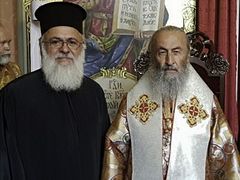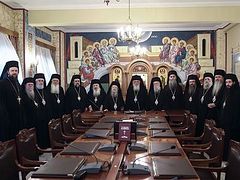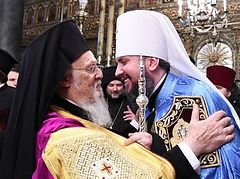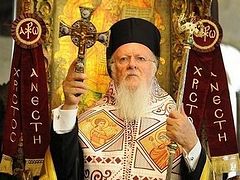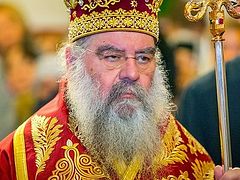Patriarch Bartholomew must have put pressure on Archbishop Ieronymos, Met. Nektarios also said.
Corfu, Greece, October 23, 2019
Politicians routinely interfere in the life of the Orthodox Church, and there must have been some kind of interference by Patriarch Bartholomew that caused Archbishop Ieronymos of Athens to speak in favor of recognizing the schismatic “Orthodox Church of Ukraine” at the Bishops’ Council on October 12, His Eminence Metropolitan Nektarios of Corfu of the Greek Orthodox Church believes.
At the same time, while Synods, primates, and hierarchs from every Local Church have called for a pan-Orthodox council to resolve the Ukrainian crisis, Patriarch Bartholomew alone stands against conciliarity and dialogue, Met. Nektarios says.
Ethnic struggles
“I don’t know if Archbishop Ieronymos was pressured or how he was pressured. However, I think there must have been some kind of serious interference from Ecumenical Patriarch Bartholomew, who pointed out that we are one race—and that is true—and that we as the Orthodox Church of Greece must join with him and the Ecumenical Patriarchate in recognizing the autocephaly of the church of Ukraine,” Met. Nektarios emphasized in a recent interview with Enimerosi.
Unfortunately, the Ukrainian crisis is routinely presented by Constantinople and its supporters as a battle of Greeks vs. Slavs for preeminence in the Church. Metropolitan Chrysostomos of Dodoni openly declared that the Greek Church must stand with Constantinople because of shared Greek blood, and a number of hierarchs who spoke at the Bishops’ Council on October 12 focused not on the canonical norms of Orthodoxy, but rather on ethnic ties and frustration with Russian diplomacy.
“Will we reject the most sacred institution of the nation?” Metropolitan Paul of Drama said, arguing in favor of supporting Constantinople in its Ukrainian invasion.
And, unfortunately, in October of last year, Pat. Bartholomew himself declared that “Our Slavic brothers cannot tolerate the primacy of the Ecumenical Patriarchate and our nation in Orthodoxy,” and “Whether our Russian brothers like it or not, sooner or later, they will follow the decisions of the Ecumenical Patriarch, because they have no other choice.”
Geopolitical factors
There is a great deal of politics behind the crisis in Orthodoxy, Met. Nektarios believes, and Church schisms and disagreements coupled with geopolitical shifts pose a great danger for Greece. Therefore, the hierarchs of the Greek Church must be careful and not rush, as Met. Nektarios wrote in his letter before the Bishops’ Council on October 12, and which he entered into the minutes of the Council. He was unable to attend the council, as he was previously scheduled to take the hand of St. Spyridon to Bucharest for the consolation of the Romanian faithful.
A number of other hierarchs from around the Orthodox world, including Patriarch Theophilos of Jerusalem, Metropolitan Rostislav of the Church of the Czech Lands and Slovakia, and Metropolitan Seraphim of Piraeus have also commented on the geopolitical nature of the creation of the OCU and the crisis surrounding it.
Interestingly, Metropolitan Ignatius of Dimitriados, the chairman of the Synodal commission on Orthodox and inter-Christian relations, which recommended recognizing the OCU, acknowledged the geopolitical factor in his report to the Greek hierarchs, arguing that Constantinople’s actions are acceptable since all autocephalies have always involved geopolitical factors.
Former President Petro Poroshenko of Ukraine made no secret of the fact that the creation of the OCU was merely a political maneuver for him, and the U.S. State Department has been equally open about its support for the creation of the OCU, which was a key factor in Patriarch Bartholomew’s decision to go ahead with his autocephaly project.
“Politics have always followed Church crises in history,” Met. Nektarios of Corfu said. “Unfortunately, politicians always push the Church to serve their interests, and, creating crises among us, they have the possibility of raising the crises to another level.”
Instability in the Greek Church
This interference from politicians and Patriarch Bartholomew has created instability in and sent serious shockwaves through the Greek Church, especially following the Liturgy concelebrated by Pat. Bartholomew and Abp. Ieronymos in Thessaloniki on Saturday, in which Epiphany Dumenko, the head of the schismatic OCU, was commemorated, Met. Nektarios says.
“There were very serious upheavals in the Orthodox Church of Greece yesterday (Sunday) after the commemoration of the metropolitan of the church of Ukraine in the concelebration of the Ecumenical Patriarch and our Archbishop, which took place in Thessaloniki,” His Eminence emphasized.
However, this is not the first serious shock to the Greek Church in recent years, he noted. “And do not forget that our Church also received ‘shocks’ in 2016 from the Crete Council, when not everyone was in agreement.”
The fact that several bishops called for a vote on the matter of recognizing the OCU and continue to oppose the Greek Church’s trajectory must not go unnoticed, Met. Nektarios emphasizes.
“There were voices and reactions, that such a serious decision should have been made by way of a vote, but the Archbishop did not take them into account and proceeded to recognize the autocephalous Church of Ukraine. The fact that such a current exists in our Church cannot go unnoticed,” Met. Nektarios explained.
Constantinople blocks dialogue
In his opinion, the Greek Church should play a mediating role in the conflict between Moscow and Constantinople, though Constantinople is unwilling to dialogue.
“I believe that the Church of Greece should play a mediating role in the conflict between the Patriarchate of Constantinople and Moscow. This was also emphasized in my letter to the Holy Synod. I was informed that everyone wants to have a dialogue except the Ecumenical Patriarch, who is unmoving. Unfortunately, he does not share the view of all those who called for a pan-Orthodox council at which the ‘Ukrainian question’ would be put on the table” the Greek hierarch said.
And Pat. Bartholomew has not merely remained silent on the matter, but specifically responded to Patriarch John of Antioch’s call for a pan-Orthodox council, saying it would be useless, because the Churches would just get together and disagree.
Moreover, Met. Nektarios says that he himself would like to play a mediating role, as he maintains excellent relations with the Moscow Patriarchate. He thus rejects the notion that he would lead a rebellion within the Greek Church, although he has received a great deal of criticism for his openness to the Russian Church. Russians have a great veneration for St. Spyridon and flock to Corfu in large numbers every year to venerate his relics.
Recall that Archbishop Chrysostomos of Cyprus was attempting to mediate and build an Orthodox consensus, having met with 6 of his brother primates. However, Pat. Bartholomew was angered by his peacemaking, and the Archbishop stopped.
“My feelings are definitely mixed,” Met. Nektarios concludes. “I feel shameful as I rejoice in the acceptance and love I receive from Russia because these people have helped us for many years, but I also feel sorry for everything that is happening in our Church. But I’m certainly not afraid ... God is great!”

